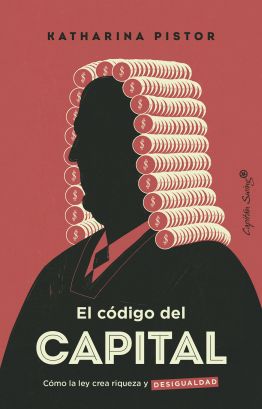Who writes the rules of the capitalist game?
- Dossier
- Oct 22
- 7 mins

The capitalist game is about employing a social resource – the legal system – for private gain. It is played in the service of private actors, but the decisive actors are not the players, they are the lawyers. They shape the rules in order to meet the needs of their clients, and they do so while the game is being played. It is as if each soccer player had his own referee and he negotiated with the referees of the other players on how to apply the rules to every pass and every action. Many of the lawyers’ actions are difficult to detect, as access to private contracts is limited.
How societies organize their social and economic lives is no trivial affair. Some understanding of shared norms, common goals, and processes for resolving conflicts are indispensable for even small social groups to function. The key elements, it is often said, are institutions, or “the rules of the game” (Douglas North). In relatively small, homogenous societies, informal rules prevail. Daily practices, reinforced by communal authorities, ensure that most members observe most rules most of the time. More complex societies tend to rely on formal rules to a much larger extent. They operate as coordination mechanisms that have the blessing of legal authorities, such as legislatures, courts, and regulators. It follows that these formal rules can be enforced, if necessary, with the help of the state’s coercive apparatus. Access to this apparatus is by no means limited to public officials. Individuals, businesses, and others can harness these powers by litigating or petitioning regulatory authorities.
Yet, the metaphor of the “rules of the game” is as powerful as it is misleading. It depicts the legal system as a relatively stable set of rules that are enforced by a referee – a neutral observer who ensures that everybody plays by the rules. This is a highly idealized depiction of how legal and economic systems work. Truth be told, it does not even work for sports games. As every soccer fan knows, rules are often relatively broad and leave ample room for interpretation when applied to the facts. Was this truly a foul? Did the ball cross the line? Moreover, referees do not see everything and, as a result, players often get away at least with infractions of the rules. Of course, players from the opposite team might call out a foul, but the burden is on them to convince the referee that they speak the truth rather than faking it in the hope of securing a penalty.
In economic life, things become even more complicated. Exchange relations in market economies are governed by contracts that are written by the players themselves. In theory, they negotiate the terms of the contract; in practice, the party with the greater market power typically uses a standard contract, a take-it-or-leave-it option. We do not negotiate with Amazon, Google, or Facebook the terms for using their platforms; we are told that by clicking “agree” we accept their terms. Some jurisdictions protect consumers from predatory contracting behavior by powerful players, but it is ultimately left to the consumers to defend their rights, often a costly and time-consuming proposition.
In short, economic relations in complex market economies are not just economic but legal relations. The law does not just patch up commitment devices or reduce transaction costs; it enables contracting between anonymous parties in large-scale markets. Controlling the terms of the legal relation is as important as controlling the production process of the goods and services, the objects of this exchange relation.
What is more, many objects of exchange relations, including the most valuable assets in advanced financial or knowledge capitalism, are creatures of the law. In the old days, people traded in ploughs, cattle, and produce. Today, financial assets and intellectual property rights make up the lion’s share of the market capitalization of listed companies. Intellectual property rights do not exist in nature; they must be created and recognized in law. The same is true for financial assets. They are promises to receive some payment in the future, which can be more or less specified. Shares in corporations are a relatively open promise to receive a share of the firm’s profits should there be any. In contrast, credit claims give the creditor a claim to receive a specific amount of payment at a specific time, plus interest. In addition, they may obtain a guarantee or collateral as additional legal protection for their claim.
Once upon a time, wooden sticks represented the debt of states and shares were represented by pieces of paper that were traded by passing them on to others. Even then, this game was never about owning the sticks or hording pieces of paper, but about the rights they embodied. Today, computer entries have replaced physical representations of legal rights. The rights themselves are specified in detailed contracts that often run into hundreds of pages of incomprehensible legalese. Other than the lawyers who craft them, few ever read them or have the time to do so. However, when markets turn and debtors start defaulting, the rights embedded in these contracts is all those creditors have left. They will determine the size of the cuts they will suffer. Bankruptcy is the acid test of the rights that were created much earlier – but with the right lawyers in the anticipation of such an event.
Attorneys create monetizable value by exploiting gaps and ambiguities in existing law to advance their clients’ interests and shift the risk of future uncertainty to others.
Lawyers, or more specifically, attorneys who advise private parties on their deals, are drafting these rights based on their understanding of the law: its limits, but also its opportunities. This is why I call them the masters of the code. They like to portray themselves as part of the packaging industry – they wrap up their clients’ wants to ensure that they comply with the law. The size of legal profession and pay grade of its top echelon, however, means it is difficult to justify this rationale alone. In fact, attorneys create monetizable value by exploiting gaps and ambiguities in existing law to advance their clients’ interests and shift the risk of future uncertainty to others. They code capital by grafting existing legal modules on new asset classes.
Basic legal institutions, such as property rights or collateral law, were first developed with tangible assets in mind, and land in particular. With some modification and add-ons, and with little change in substance, today the same institutions are employed for securitization, derivative, and other complex financial structures. The basic idea is always the same: first, assets (land or future cash flows) are partitioned and legally enclosed; second, different claims to these new assets are ranked; and third, obligations, including liabilities that flow from controlling assets, are shifted to others.
It often takes a court case to reveal information that is otherwise guarded by commercial and trade secrets.
In short, the capitalist game is about employing a social resource – the legal system – for private gain. This game is played in the service of private actors, but the critical actors are not the players, they are the lawyers. They shape the rules to fit their clients’ needs – and they do this while the game is in motion. It is as if every soccer player had his own referee who negotiated with the referees of other players how to apply the rules to every pass and every action. Much of what lawyers do is difficult to detect, as access to private contracts is limited. It often takes a court case to reveal information that is otherwise guarded by commercial and trade secrets. This works because the coding of capital takes place in the shadow of the law. As a result, we often learn only in a crisis how much the law has evolved in the hands of the masters of the code. Legislatures then try to catch up, but often fix an old problem even as the world around them moves on to write the rules for the next game.
Recommended publications
 El código del capitalCapitán Swing, 2020
El código del capitalCapitán Swing, 2020
The newsletter
Subscribe to our newsletter to keep up to date with Barcelona Metròpolis' new developments




